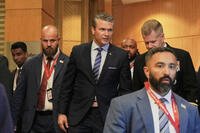Defense Secretary Ashton Carter said Tuesday that splitting up U.S. Cyber Command and the National Security Agency was under consideration but a lack of high tech talent was delaying the process.
"We don't have any timeline but we're looking at this question" of what would be entailed in separating the NSA from CyberCom, which are both now under the command of Adm. Mike Rogers, Carter said. "We haven't made any decisions in that regard," he said in a question-and-answer session at the TechCrunch Disrupt 2016 conference in San Francisco.
"At the moment, we have the NSA, which is part of the intelligence community, managed by the Department of Defense, and CyberCom, which is a combat group whose first job is to protect," Carter said. NSA and CyberCom have traditionally been under the same umbrella because "there haven't been enough good people to go around," he said.
The idea of splitting up NSA and CyberCom came under attack Tuesday at a hearing of the Senate Armed Services Committee, where Sen. John McCain, an Arizona Republican and the committee's chairman, charged that the panel was blindsided by the proposal.
McCain charged that there was "no consultation from the White House" on possibly turning the position of NSA director into a civilian post. If that should happen, "I will object to the confirmation of the person nominated," he said.
Carter was in San Francisco as part of his outreach to Silicon Valley and the high-tech community through his Defense Innovation Unit-Experimental, or DIUx, which is described by the Pentagon as a "Department-wide initiative to pursue innovative ways to sustain and advance the capabilities of the 'Force of the Future.'"
DIUx already has offices in Palo Alto, California, and in Boston, and Carter was expected to announce the opening of a third DIUx office in Austin, Texas, this week.
On other topics, the secretary sidestepped when asked if he would consider staying on as Defense Secretary under the next president. "I'm completely focused on serving the president who made me Secretary of Defense," he said. "I'm completely focused on what I'm doing right now."
Carter also wouldn't be pinned down on what should happen to alleged NSA leaker Edward Snowden or whether he should be eligible for a pardon, though the secretary let it be known that he took a dim view exposing secrets.
"All of us who enjoy the public trust and who handle classified information have a responsibility," Carter said. "And I think to arrogate to oneself the authority and to basically take something that has been entrusted to you, that is something I can't condone."









